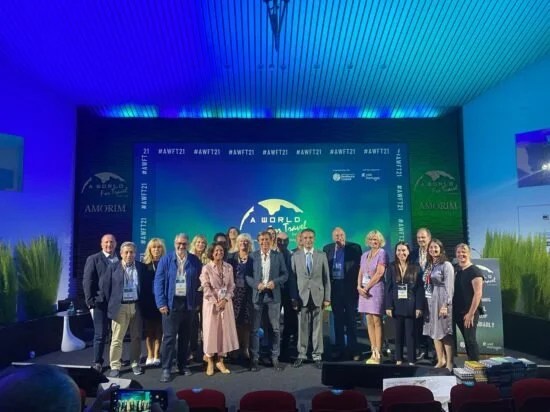The Évora Forum – A World for Travel Takes the Lead in Sustainable Actions for the Travel Industry
Over two dozen ministers and government officials; 140 speakers, professors and industry leaders, joined together at the Évora Forum – A World for Travel and announced the five urgent acts towards moving the travel industry towards unified sustainability. By issuing these acts the organizers intend to accelerate the transformation of the travel industry towards a more sustainable future. Thousands joined the event virtually from over 80 countries, whilst 350 delegates were in person at Evora, Portugal.The teams at A World for Travel and the Resilience Council developed a baseline of where the travel industry currently is in terms of sustainable actions and goals. This data was used to develop the five urgent acts which are commitments towards sustainability and regenerative travel. The two-day forum exposed industry leaders’ concerns through over 30 sessions and discussion groups. The global traveller sentiment survey conducted by Oliver Wyman in September 2021 found that environmental sustainability measures continued to rank last and only 17% of consumers globally consider this as a top three priority when deciding about one flight over another. This is where the travel industry has an opportunity to reset and rebuild for the better.The five urgent acts agreed will be the beginning of a continuous approach following the baseline taken this week and aim to encompass: regenerative travel, business travel reset, deep community engagement, carbon reduction & compensation, tourism funding and investment and local supply chain development.The overriding message coming out of the forum is there are many actions to be taken but they must be done through the combined collaboration of all stakeholders. And action must be taken immediately by each sector.The five commitments developed and announced were:1. OFFER RELIABLE CARBON COMPENSATION OPTIONS / INCENTIVES
With only 10% of airlines offering voluntary carbon offsetting and consumer confidence in the credibility of many schemes very low the introduction of the industry adopting a unique carbon footprint calculator and tax incentives and public investment in cleaner plans will play a big part in this act.2. COMMIT TO A CARBON REDUCTION PLAN FOR EVERY SECTOR
There has been a 60% growth in tourism related CO2 emissions between 2005 and 2015, with an expected rise of CO2 emissions for 2030 unless decarbonisation is accelerated, it is crucial to reduce carbon across every sector. Many corporations and travel companies already have net zero targets in place, but it now critical that every organisation meets this goal and is scored by international certification companies.3. PRIORITIZE INVESTMENTS TO DEVELOP SUSTAINABLE TOURISM
The average Travel and Tourism Capital Investment is 17% as a contribution to GDP and this spending needs to be increased to develop sustainable tourism. Many countries do not invest enough in tourism and soon it will become more difficult to invest without a sustainable tourism plan as banks prioritise those investments with strong ESG credentials.4. INVITE COMMUNITIES TO CO-DESIGN TOURISM SOLUTIONS
This commitment is based on the strongest theme which came out of the Evora Forum. It is crucial to ensure tourism benefits the places and people it touches. 70% of tourists want to positively impact the economy and the environment they travel to and so this commitment strongly aligns with consumer demand. Incentives and best practice plans need to be put in place to show the world how tourism and community can be mutually beneficially of each other.5. ACCELERATE & STRENGTHEN LOCAL SUPPLY CHAINS / ECOSYSTEMS
Dovetailing with the fourth act, businesses should always choose a local supplier even if more expensive. 95% of visitor expenditure leaks from destinations in developing economies, meanwhile 83% say that it is right that businesses and brands focus on a positive impact, rather than just doing less harm to the planet and its people.H.E. Rita Marques, secretary of state for tourism of Portugal said, ‘We leave Evora, with a mission: to educate and empower the next generation about the impact of our choices and the huge effect these choices have on the health and wellbeing of both ourselves and our planet.”Christian Delom, secretary general, A World for Travel said, “The travel industry in its current form cannot continue, these five commitments, developed by tourism ministers and industry leaders, represent drastic changes which can be implemented to support the transformation of travel for a more sustainable future. We stand behind these acts and have given our commitment to the industry that we will increase messaging, facilitate partnerships, share key information and data, advocate for thought leadership across the world and find a way to measure these initiatives to achieve significant progress. We stand in solidarity through our actions.”Frederic Vanhoutte, President Director General, Eventiz Media said, “This week we have created the spirit of Evora, by listening to the industry’s call for concrete action to accelerate the transformation of travel for a more sustainable future. By the five urgent acts we aim to both change behaviour and provide immediate compensation. It is a fact recognised by the industry that sustainable companies perform better but also that the travel industry is well behind the curve. With these firm commitments we hope to make significant progress and create thousands of new ambassadors for sustainable tourism.”Over 30 presentations, panel sessions and discussion groups took place during Évora Forum – A World for Travel where a number of issues were debated from the economics of tourism to tourism’s impact on the environment.
